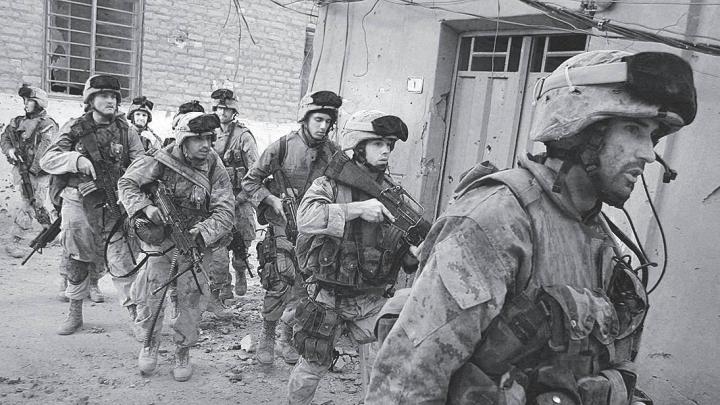Seth W. Moulton ’01, M.B.A.-M.P.P. ’11, must be the first person to have joined the U.S. Marines because he played the organ. Moulton, who served four deployments to Iraq, picked up the hobby in high school and during college used to practice in Memorial Church. It’s how he met his mentor, the Reverend Peter Gomes.
“Reverend Gomes talked a lot about the importance of service, and how it wasn’t enough just to believe in service, or support those who serve—you ought to go out and serve yourself,” Moulton remembers. “It was through spending a lot of time at Memorial Church and listening to him that I worked up the courage to go join the Marines—because I thought that was a great way to serve, and there probably weren’t enough people from places like Harvard who were going to do it.”
The Marblehead, Massachusetts, native joined the corps on the heels of the September 11 attacks, having made the decision during senior year. In his initial deployment, his platoon was among the first company of Marines into Baghdad (“We were wearing chemical suits expecting to get hit by chemical weapons the whole way”). Later, they were sent to Hillah, in central Iraq, where Moulton ended up in charge of a newspaper and television and radio stations, as well as a hit TV show—Moulton and Mohammed—that he and his translator created and produced together for several months until Moulton’s deployment ended. “Rupert Murdoch had nothing on Second Lieutenant Moulton in Iraq 2003,” he jokes.
By his second deployment, with the Iraqi insurgency in full swing, Moulton saw heavy combat, including a nightmarish firefight in a cemetery during the Battle of Najaf. In his third and fourth deployments—he voluntarily returned for the fourth to be part of the 2007-2008 “surge”—he and a handful of other young Marines (including Barrett Bradstreet ’01 and Ann Gildroy Fox, M.B.A. ’07), served directly under General David Petraeus, working with Iraqi security forces to bolster the counterinsurgency. (“His initiative, innovativeness, courage, capacity for work, and sheer determination were all off the charts,” Petraeus recalls.)
Moulton returned to Harvard in 2008 for the three-year joint M.B.A.-M.P.A. program—a “very effective transition” that he says helped him apply what he’d learned in the military to civilian life. In his second year, he joined a team of doctors and military veterans on a trip to Haiti after the January 2010 earthquake; they helped create an electronic medical-records system to support relief efforts. “I wasn’t a doctor,” he explains, “but I did know how to put together a plan.”
Though graduate school helped bridge the divide, Moulton maintains that military and civilian leadership are more similar than they appear. “At the end of the day, in the Marine Corps, the 18-year-old Marine in your platoon who you ask to risk his life is going to do it because he trusts you. Not because of the chain of the command, not because he’s afraid of getting in trouble—he’s going to put his life on the line because he trusts you as a leader. And so the good leaders who come out of the military really learn that, and that’s absolutely, directly applicable to the civilian world.”
Now he’s running in his home congressional district, the Massachusetts Sixth, against his own (Democratic) party’s incumbent. He’s animated by the same ethic that made him enter the Marines. “I was in a war where I saw firsthand the consequences of terrible leadership in Washington,” he says. “When you’re in an environment like the Marine Corps, or in a place like Iraq, when something doesn’t go right, you can’t just blame someone else or say, ‘Well, you know, my platoon screwed it up, but the guys who take over for us in six months are going to fix it.’ That’s just not really acceptable.”
He quotes by heart the inscription in the World War I Memorial Room in Memorial Church: “While a bright future beckoned, they freely gave their lives and fondest hopes for us and our allies that we might learn from them courage in peace to spend our lives making a better world for others.” “That’s always stuck with me,” he says. “I think it speaks to that sense of responsibility that comes with citizenship, which is important and which I think in some ways has been lost by a lot of people in America—including a lot of people in Washington.”







